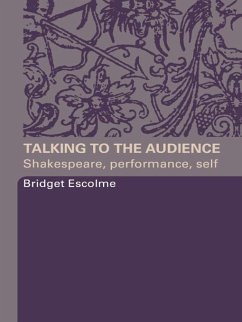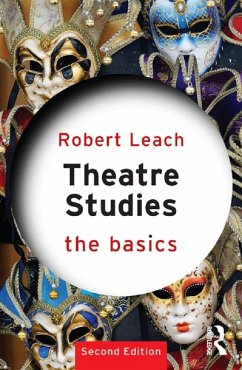
Prologues to Shakespeare's Theatre (eBook, ePUB)
Performance and Liminality in Early Modern Drama
Versandkostenfrei!
Sofort per Download lieferbar
39,95 €
inkl. MwSt.
Weitere Ausgaben:

PAYBACK Punkte
20 °P sammeln!
This eye-opening study draws attention to the largely neglected form of the early modern prologue. Reading the prologue in performed as well as printed contexts, Douglas Bruster and Robert Weimann take us beyond concepts of stability and autonomy in dramatic beginnings to reveal the crucial cultural functions performed by the prologue in Elizabethan England. While its most basic task is to seize the attention of a noisy audience, the prologue's more significant threshold position is used to usher spectators and actors through a rite of passage. Engaging competing claims, expectations and offer...
This eye-opening study draws attention to the largely neglected form of the early modern prologue. Reading the prologue in performed as well as printed contexts, Douglas Bruster and Robert Weimann take us beyond concepts of stability and autonomy in dramatic beginnings to reveal the crucial cultural functions performed by the prologue in Elizabethan England. While its most basic task is to seize the attention of a noisy audience, the prologue's more significant threshold position is used to usher spectators and actors through a rite of passage. Engaging competing claims, expectations and offerings, the prologue introduces, authorizes and, critically, straddles the worlds of the actual theatrical event and the 'counterfeit' world on stage. In this way, prologues occupy a unique and powerful position between two orders of cultural practice and perception. Close readings of prologues by Shakespeare and his contemporaries, including Marlowe, Peele and Lyly, demonstrate the prologue's role in representing both the world in the play and playing in the world. Through their detailed examination of this remarkable form and its functions, the authors provide a fascinating perspective on early modern drama, a perspective that enriches our knowledge of the plays' socio-cultural context and their mode of theatrical address and action.
Dieser Download kann aus rechtlichen Gründen nur mit Rechnungsadresse in A, B, BG, CY, CZ, D, DK, EW, E, FIN, F, GR, HR, H, IRL, I, LT, L, LR, M, NL, PL, P, R, S, SLO, SK ausgeliefert werden.













